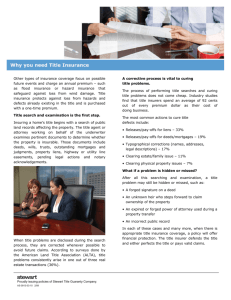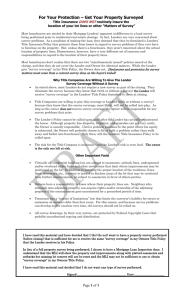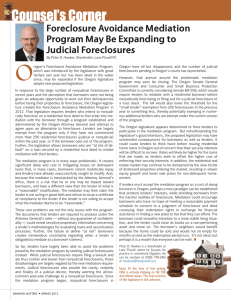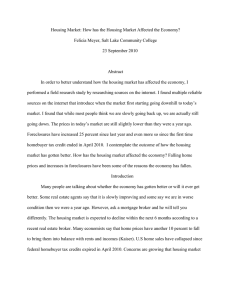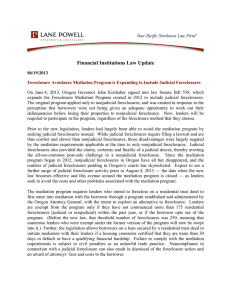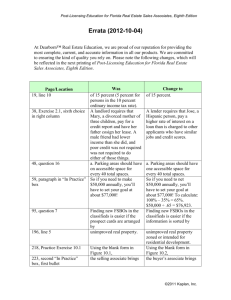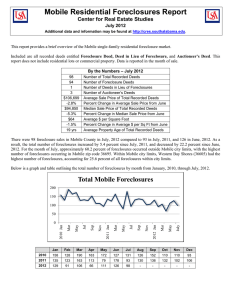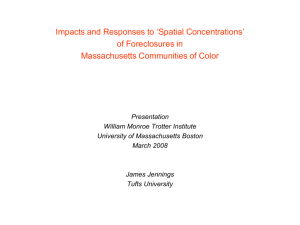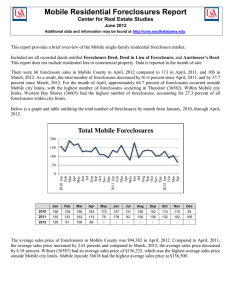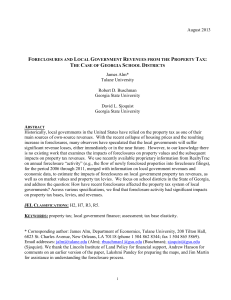The Washington Post - Lord and Saunders Real Estate
advertisement
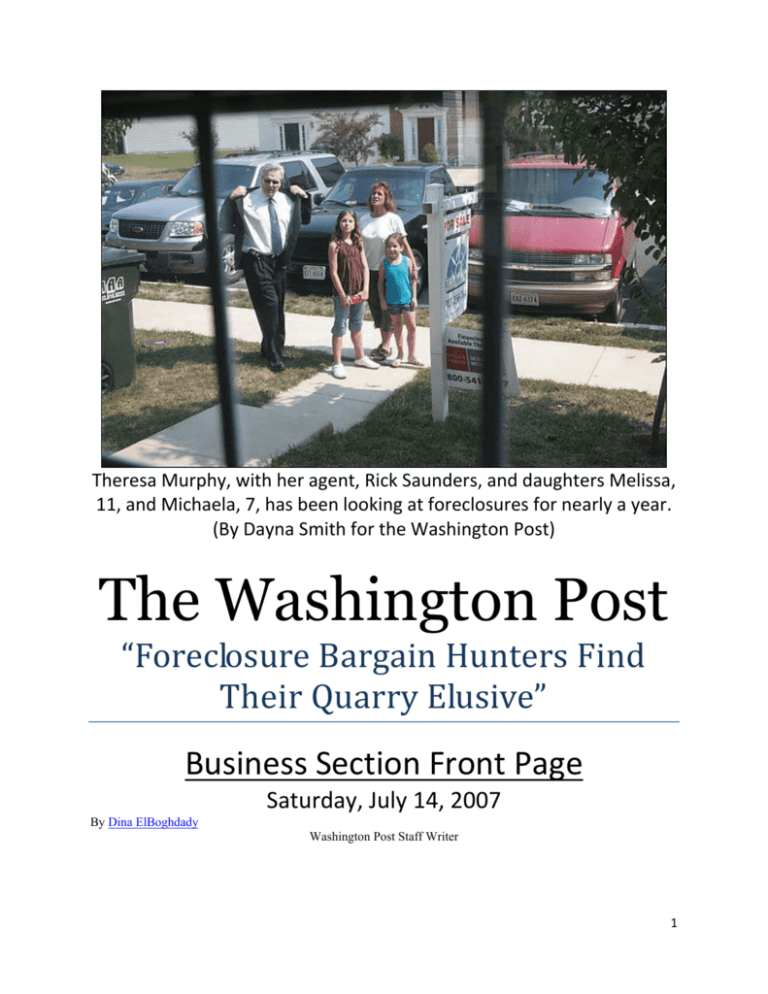
Theresa Murphy, with her agent, Rick Saunders, and daughters Melissa, 11, and Michaela, 7, has been looking at foreclosures for nearly a year. (By Dayna Smith for the Washington Post) The Washington Post “Foreclosure Bargain Hunters Find Their Quarry Elusive” Business Section Front Page Saturday, July 14, 2007 By Dina ElBoghdady Washington Post Staff Writer 1 The house Diana Hennigh wanted had been repossessed by a bank months earlier. It stood empty. It needed work. It was in a Prince William County neighborhood teeming with for-sale signs. The bank, she figured, would quickly unload it to her and her husband at a bargain price. "We were wrong," Hennigh said. "We had a friend who bought a house the regular way at the snap of a finger compared to what it took us to get to the settlement table on this one." Bargain-hungry house hunters have turned their attention to the growing pool of foreclosures on the region's market. But the sweet deals, if they find them, come with plenty of challenges, in part because many buyers have unrealistic expectations about what it takes to buy a house owned by a lender. Some potential buyers don't find the rock-bottom prices they expect. Others can't get the banks to promptly respond to offers. Many give up before they get that far because they're overwhelmed by the repairs some homes require. The lenders, usually large corporate entities based far from the homes they're selling, may not be eager to strike a deal, said Guy Cecala, publisher of Inside Mortgage Finance, a trade publication. Some may want to hang on to a home so they can avoid reporting it as a loss. Others may be less motivated to sell in areas like Washington, where the volume of foreclosures is relatively low, than they are in more economically troubled areas. There are 16 foreclosures for every 10,000 properties in the Washington area, compared with the national average of 37, according to George Mason University's Center for Regional Analysis. In Detroit, Las Vegas and Atlanta, the rate exceeds 100. "When lenders start seeing foreclosed properties coming in faster than they're going out, that's when they're most motivated to sell," Cecala said. "In this area, we're probably just at the start of the rising foreclosure market. In another six months, there may be more deals." After a homeowner misses about three mortgage payments, the lender can initiate a foreclosure. If the borrower can't bring the mortgage current, the property goes up for auction at the local courthouse or an auctioneer's gallery. In most cases, the lender sets the opening bid, which often is the amount that is owed. In some circumstances, it can be less, said John W. Anderson, a senior vice president at Clayton Holdings, which manages mortgages for lenders and investors. For instance, if the debt owed on a house is $210,000 but the house is worth $200,000, the lender could set the opening bid at $200,000 minus whatever it would cost to resell the house, he said. Those costs include evicting the occupants; rekeying the doors; cleaning the property; and paying taxes, closing costs and real estate agent commissions. 2 "We would much prefer that somebody else take on the headaches with some of these homes," said Bob Norrell of Litton Loan Servicing, which services 400,000 loans and manages 12,000 foreclosed properties nationwide. Most willing to take on the challenge are investors like Dean Hastie, who recently joined more than two dozen other professional buyers for an auction at a park bench behind the Prince George's County Courthouse. "Retailers don't really show up here much," Hastie said. In investor jargon, retailers are traditional home buyers. "It's the most dangerous way to buy a house." Among the dangers is that many homes for auction are occupied, which means buyers rarely can determine the condition of the home. It also means that appraisers can't get into the home, complicating financing. Bidding also requires a hefty deposit, usually a cashier's check for about 10 percent of the opening bid. That's just the beginning. A property can be yanked away from the winning bidder if a homeowner sells the home, refinances or files for bankruptcy protection within a certain time. Even without such complications, months can pass in some states, like Maryland, before the courts ratify a contract. When home prices were climbing, investors took their chances, confident that they could renovate and flip houses for a handsome profit. But when the market soured, their enthusiasm waned, in part because they figured that many houses were worth less than the balance of the loans, so lenders ended up keeping more of the houses themselves. "The banks started referring those properties out to real estate brokers," Norrell said. "That created opportunities for the average person to buy properties that they previously could not purchase." Among them were the Hennighs, who paid $649,000 for their Colonial, about $900 less than the asking price but $14,000 more than they offered. The couple also asked the lender to pay $14,000 in closing costs; the lender agreed to kick in $13,000. It was an "okay" deal, Diana Hennigh said. Similar homes in the area sold in the mid- to upper $600,000s. But the process tested their patience. The bank ratified their contract 16 days after they made their initial offer, said their agent, Gerry Staudte, who works at Long & Foster's Burke-Fairfax Station office. Changes to the contract, even fixing a typo, set back the timing. "You can usually hammer out a contract within days," Staudte said. But "I understand that the bank [employee] in charge of the sale had 200 other properties to deal with," he said. And the day the Hennighs finally moved in, the air conditioning didn't work. 3 The Hennighs could consider themselves lucky in some ways. Trisha Cooper, an agent with Re/Max Platinum Group Realty in Fredericksburg, said one of her clients waited 31 days for a response, only to be rejected. He had offered $323,000 for a house listed at $325,000. "People think the word 'foreclosure' is like the word 'bargain,' " Cooper said.”But there are few bargains to be had and lots of stress." Many of the foreclosure homes on the market belonged to subprime borrowers, typically people with poor credit who got loans during the housing boom. In the year ended in April, subprime borrowers in Virginia, Maryland and the District lost 3,100 homes that lenders are now selling, up from 1,200 each of the previous two years, said Mark Carrington, director of analytical sales at First American Loan Performance, a research firm that tracks nine of the 10 major subprime-loan servicers. Setting a price for those homes is not a science. But it's not a "stare-at-the-ceiling figure," either, said Joe Sugden, a real estate agent at Fairfax Realty who specializes in selling foreclosures. At courthouse auctions, lenders cannot keep more than what they're owed on the house. But on the open market, they can ask for whatever they see as fair market value, Sugden said. "All factors are taken into account, including the condition of the home and the market in that area." In the end, it's up to the buyer to decide if the price is right. Bernice Palys decided it was not. Palys looked at six foreclosures in South Riding. Most of them needed at least $20,000 in repairs, which she said more than offset the low prices. "One of them was only a few years old, and it was not in the best location," she said. "There was damage to the carpet. It needed new flooring and repairs to the walls. It needed a refrigerator and painting. All these things add up" (Ms. Palys is represented by Lord and Saunders Real Estate, Inc.). For people looking for a home in move-in condition, a foreclosure is not the best bet. Most are sold as is. People looking for a steal also are likely to be disappointed, said Tom Keats, a Virginia real estate broker who specializes in selling foreclosures. He said someone recently offered him $140,000 for a home just outside Leesburg priced at $1.1 million. "People don't understand -- we're not going to give it away," he said. But decent deals can be had by those who wait, said Doug Hill, an agent with Re/Max Allegiance in Dale City. Banks often hire an appraiser and at least one real estate agent to help price foreclosures before putting them up for sale. "They usually take the highest price, and they walk the price down." That's why Theresa Murphy of Gainesville is still waiting to buy. The single mother has been looking at foreclosures since August. She could not afford some of the ones she wanted. Others have sat on the market for ages, including one where the price has dropped 4 six times in the past year, from $352,000 to $282,000 (Ms. Murphy is represented by Lord and Saunders Real Estate, Inc.). "How can we take $282,000 as the real price when we see the pattern of a drop every 30 days?" asked her agent, Rick Saunders of Lord and Saunders Real Estate. "It just keeps dropping, dropping, dropping," Murphy said. "There are a whole lot more now under the $300,000 mark, which is where I want to be" (emphasis added). 5

